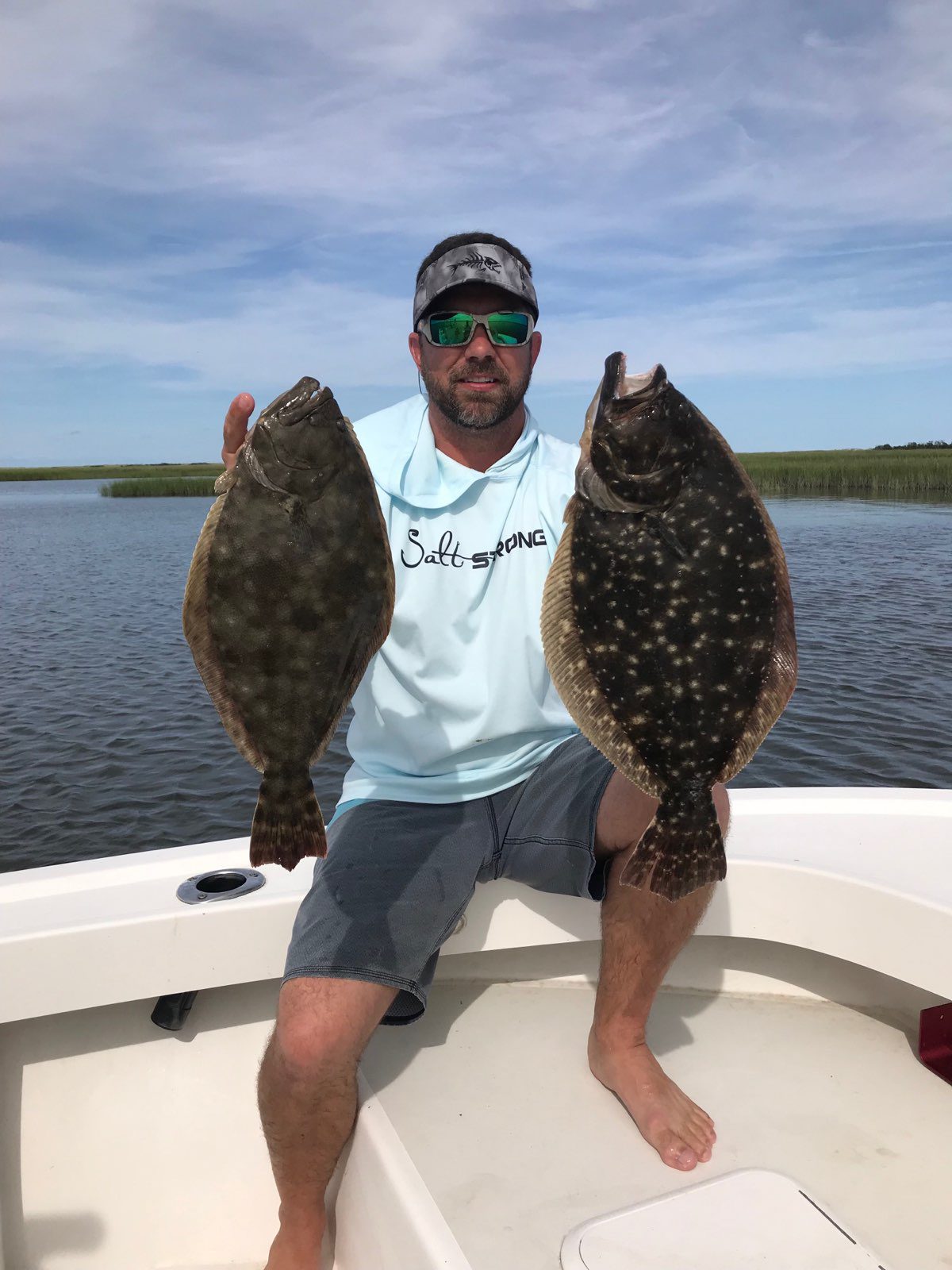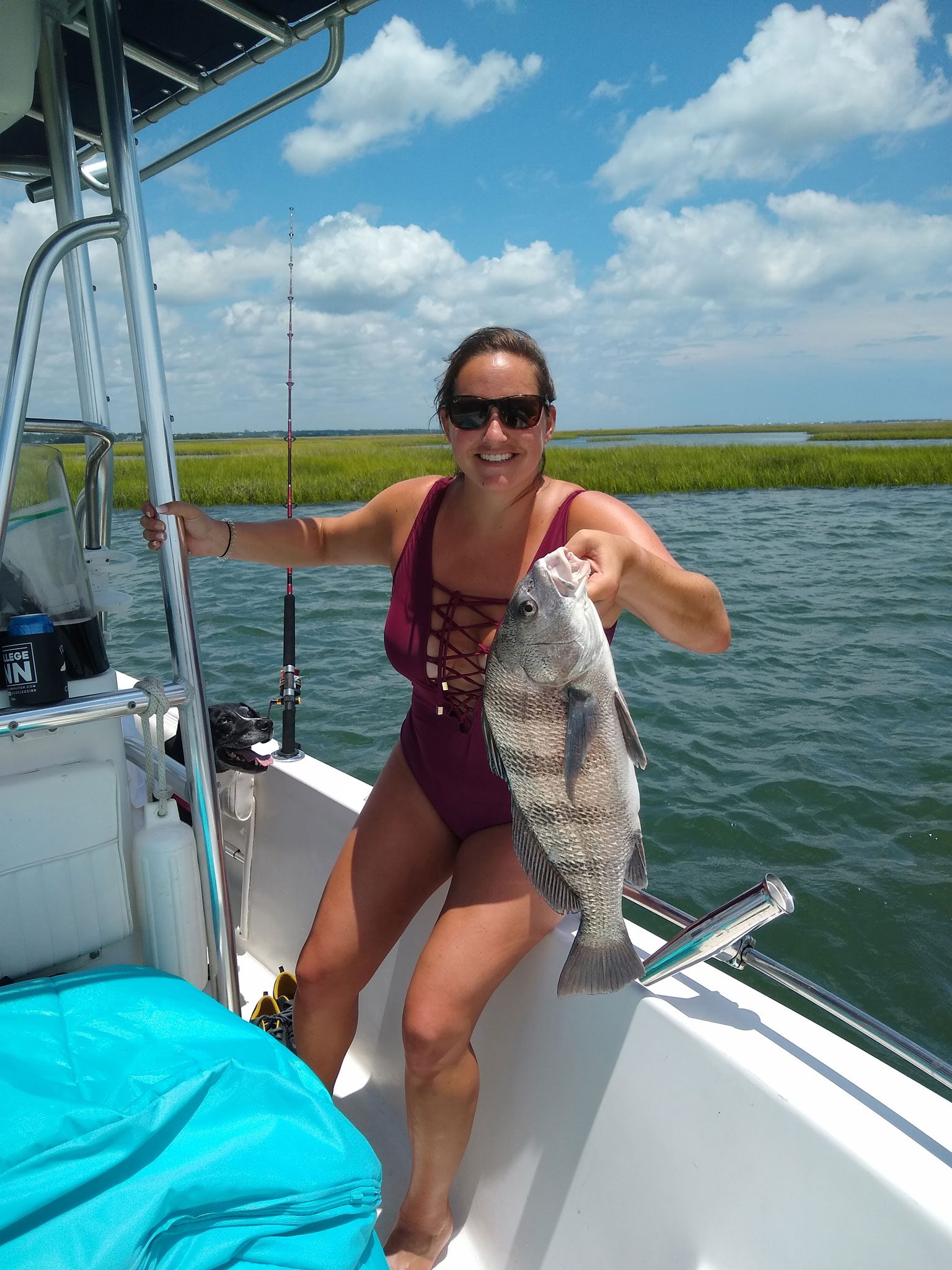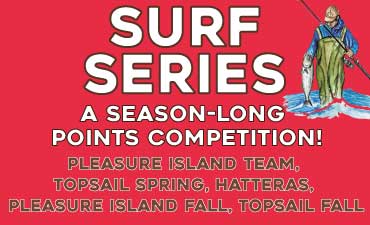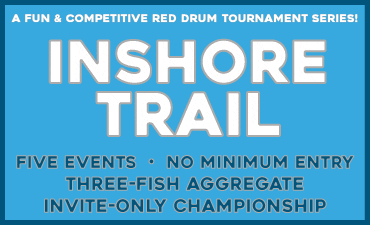Topsail / Sneads Ferry – July 18, 2019
Mike, of Native Son Guide Service, reports that red drum fishing has been very good from the inlet all the way into the ICW. Anglers have been targeting the fish with topwater plugs early around marsh flats and grass banks. As the sun has gotten higher, the reds have retreated into nearby holes and channels in the marsh, where they are being caught with soft plastics and Carolina-rigged live baits. Docks along the ICW have held the fish during all tide stages, with cut and live bait being the most successful in these areas.
Flounder are in these same spots, and anglers should focus on dragging baits along the bottom in the deeper holes. A good number of shorts are around, but anglers can look forward to more of the larger fish pushing in from off the beach.
Nearshore anglers have been catching spanish mackerel while fishing from the breakers out to 5 miles. Slow trolling live and dead bait rigs, as well as casting jigs, have caught a majority of the larger spanish.
A few smaller kings are mixed in with the spanish, though the hot water has them scattered.
Bottom fishing with live baits and bucktails at the ARs has been producing legal-sized flounder.

Jon Salvant with a pair of flounder caught using live bait in a creek near Topsail Island.
Chadwick, of South End Anglers, reports that red drum fishing has been great inside the inlets, with fish staged on oyster beds, grass lines, docks, and shallow flats. Carolina-rigged live and cut baits have been great options for anglers working docks and the deeper holes. Those in shallower areas are targeting fish with Rapala Skitterwalk topwater plugs, and then switching over to Z-Man soft plastic JerkshadZ and PaddlerZ as the reds push off the flats.
Flounder are in some of these same areas, and they’re hitting Carolina-rigged live baits and Z-Man soft plastics on 3/8 oz. Fathom Inshore jig heads.
Speckled trout are hitting topwater plugs in the early mornings before pushing deep, as the heat and boat traffic pulls them off the banks.
Nearshore anglers have been targeting flounder staged up at the ARs with live baits and bucktails.
Spanish mackerel and kings are being caught by pulling spoons and deep diver plugs in the 3-5 mile range. When the spanish are feeding on the surface, casting Hogy Epoxy minnows and similar glass minnow-style jigs has been very successful.
A few false albacore are also being caught with the casting jigs.
Ray, of Spring Tide Charters, reports that the nearshore bite has been great for flounder at the local ARs. Carolina-rigged live baits and bucktails fished with soft plastic trailers have been producing a majority of the fish. Getting baits tight to structure greatly increases the chance of finding keeper-sized fish (with citations very possible).
Large spanish mackerel (up to 5 lbs.) are in the upper water column around these same ARs, and they’re hitting live baits.
A few cobia have stayed around nearshore reefs with the bait, so keeping a bucktail handy is a great idea when fishing these areas throughout the summer.

Mariana Luciani with a 21″ black drum that fell for a piece of fresh shrimp while fishing in the marshes behind Lea Island.
Jim, of Plan 9 Charters, reports that large spanish mackerel and scattered king mackerel are hitting slow trolled live baits and cigar minnows on dead bait rigs in the 3-10 mile range.
Bottom fishing has been very good, with anglers catching legal-sized black sea bass, beeliners, and grouper on cut baits around structure in the 80’ range.
Mahi are in the 20+ mile range, and they’re hitting skirted ballyhoo and dead bait rigs targeted for the kings.
John, of Pelagic Hunter, reports that nearshore anglers are catching good numbers of smaller king mackerel (up to 15 lbs.) while trolling dead bait rigs in the 10 mile range.
Citation-sized spanish mackerel are being caught from the beach out to 5 miles. A few schools of false albacore are mixed in the nearshore range, and they’re hitting trolled and casted spoons.
Mahi have begun to push inshore, with anglers reporting fish in the 20 mile range while trolling skirted ballyhoo.
Bottom fishing structure and live bottoms has been producing great numbers of triggerfish, black sea bass, and grunts.
Anglers fishing vertical jigs, topwater plugs, and cut or live bait have been hooking up with some large amberjack and barracuda around wrecks.
Tyler, of Seaview Pier, reports that slot-sized red drum are being caught on Carolina-rigged cut mullet.
Bottom fishing with shrimp has produced sea mullet, croakers, and pinfish.
Bluefish are hitting Gotcha plugs and cut mullet.
Edwin, of Surf City Pier, reports that pompano fishing has been productive for anglers casting Carolina-rigged sand fleas. Good-sized black drum are being caught with shrimp on bottom rigs.
Sea mullet and spot are also feeding on baits fished on the bottom, though anglers report a better bite in the evening hours.
Large spanish mackerel (up to 4 lbs.) are hitting Gotcha plugs cast to feeding schools. Smaller bluefish are being caught on Carolina-rigged cut mullet, but the bite has been slow this past week.
Anglers fishing off the end have landed a few large king mackerel (up to 33 lbs.).
Brandy, of Jolly Roger Pier, reports that bluefish and spanish mackerel are schooled up and feeding on bait in the early morning hours.
Speckled trout are being caught with soft plastics and bottom-rigged shrimp fished in holes behind the breakers. A few legal-sized flounder are being caught in these same deep holes.
Slot-sized red drum are feeding on cut mullet fished under a Carolina rig.
Anglers fishing with shrimp and sand fleas are catching sea mullet, pompano, black drum, and croakers.





